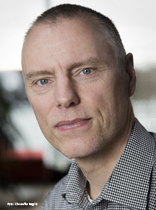Niels Brügger is now an MSO professor
Niels Brügger has been appointed MSO professor of media studies at Aarhus University. The abbreviation “MSO” stands for “with special responsibilities” in Danish.

The professorship is within the field of internet research and the digital humanities, and it lasts for five years. During this period the new professorship will involve ensuring that AU’s research into the internet and the digital humanities continues, as well as opening discussions with the areas of the humanities that are not yet digital.
“Radical changes are being made in our source material at the moment because it is becoming increasingly digital – in fact, pretty soon it will only be created in digital form. There is very little new source material in analogue form. These days digital source material includes not only stuff that is born digitally via the web, iPhone, iPads and so on, but also old material that is being digitalised. For instance, the State and University Library in Aarhus is digitalising all the Danish newspapers. This also means that the amount of digital material is growing, which is a new situation with a major impact not least on the relationship between the people responsible for source material and researchers. This new field is one of the areas I’ll be studying,” says Brügger.
Relevant research for all the humanities
This is a research field that will have a major influence on the humanities.
“A gap is growing between the old humanities and the new digital humanities as researchers start to focus increasingly on digital sources even though the old analogue sources still exist. As a result, we need to develop new methods to handle these digital sources,” explains Brügger.
The new MSO professor will also be exploring the distinction between media studies and internet studies.
“We’ve still got media studies: the study of films, TV, radio and newspapers. And we’ve also got internet studies, focusing purely on the internet. But this situation is changing as more and more old media are being transferred to the net. The point is that media issues are actually involved throughout the humanities. The question is how we can make digital sources available to researchers. And this isn’t as simple as it might sound, because it’s not just about making sources available. It’s also about the systems on which our sources are based. Which brings us back to the relationship between the people responsible for the sources and researchers,” explains Brügger.
CV
Niels Brügger has great international experience of web history as a research field, and wrote the first book on web history ever to be published back in 2010.
In 2000 he was involved in the foundation of the Centre for Internet Research. He became the director in 2010, and has been one of the driving forces behind the development of an infrastructure for internet research.
He has lived two academic lives: the first in the classical humanities with an MA in French and the history of ideas, writing about French philosophy and the history of ideas for many years. He introduced Lyotard in book form to a Danish and French audience, wrote the first book about the French philosopher and culture theorist Paul Virilio, and is the author of a book on structuralism that was published in Swedish, Danish and German.
He has a PhD from Aarhus University, and has continued his second academic life with a career as a researcher and associate professor of media studies.
Further information
Professor Niels Brügger
School of Aesthetics and Communication – Media Studies
Helsingforsgade 14
building 5347, room 236
8200 Aarhus N
Denmark
Direct tel.: (+45) 8716 1971
Mobile: +45 2945 3231
